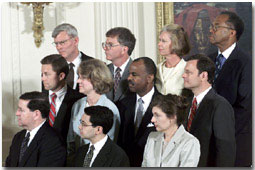
- Afghanistan
- Africa
- Budget Management
- Defense
- Economy
- Education
- Energy
- Environment
- Global Diplomacy
- Health Care
- Homeland Security
- Immigration
- International Trade
- Iraq
- Judicial Nominations
- Middle East
- National Security
- Veterans
|
Home >
News & Policies >
May 2001
|
For Immediate Release
Office of the Press Secretary
May 9, 2001
Remarks by the President During Federal Judicial Appointees Announcement
The East Room
![]() Listen to the President's Remarks
Listen to the President's Remarks
2:43 P.M. EDT
THE PRESIDENT: Thank you all very much. Attorney General, it's good to see you, sir, and happy birthday. Today is his birthday. Also, Judge Al Gonzales. Judge Gonzales is a great friend of mine who, fortunately, is my lawyer and is a part of the process, judicial selection process. Thank you for being here, Judge.

I'm also honored to welcome members of the United States Senate who are here to welcome the nominees to Washington: of course, Senator Orrin Hatch, Chairman of the Judiciary; as well as Senator Patrick Leahy, ranking member on the Judiciary. It's good to see you men, thank you both for coming.
John Warner, George Allen, George Voinovich and last, but not least, Senator Strom Thurmond. Welcome. (Applause.) Thank you all for coming.
I'm pleased to welcome my judicial nominees to the White House. And I'm pleased to welcome their family and friends, as well.
This is a proud moment for all of you, and it's a proud moment for me, as well. A President has fewer greater responsibilities than that of nominating men and women to the courts of the United States. A federal judge holds a position of great influence and respect, and can hold it for a lifetime.
When a President chooses a judge, he is placing in human hands the authority and majesty of the law. He owes it to the Constitution and to the country to choose with care. I have done so.
With me this afternoon are my first 11 judicial nominees, individuals of experience and character. Four of them serve as United States district judges, all four confirmed by unanimous votes. Two others are sitting judges on state supreme courts. Four have served as law clerks in the Supreme Court of the United States. One has served here as an associate counsel to the President. One already holds the position for which I nominate him, by recess appointment of President Clinton.
These men and women have followed different paths to this nomination. They come from diverse backgrounds, and will bring a wide range of experience to the bench. All have sterling credentials and have met high standards of legal training, temperament and judgment.
As a group, they command broad, bipartisan support among those who know them and who have served with them. I submit their names to the Senate with full confidence that they will satisfy any test of judicial merit.
These first nominations are also an opportunity to outline the standards by which I will choose all federal judges. The American people expect judges of the highest caliber, and my nominees will meet that test. A judge, by the most basic measure, has an obligation shared by the President and members of Congress. All of us are constitutional officers, sworn to serve within the limits of our Constitution and laws. When we observe those limits, we exercise our rightful power. When we exceed those limits, we abuse our powers.
Every judge I appoint will be a person who clearly understands the role of a judge is to interpret the law, not to legislate from the bench. To paraphrase the third occupant of this house, James Madison, the courts exist to exercise not the will of men, but the judgment of law. My judicial nominees will know the difference. Understanding this will make them more effective in the defense of rights guaranteed under the Constitution, the enforcement of our laws, and more effective in assuming that justice is done to the guilty and for the innocent.
My standard is informed by the oath that each judge will take: to administer justice without respect to persons, and to do equal right to poor and to the rich. A good judge exercises these powers with discernment, courage and humility. These are commitments, not just to philosophy, but of character.
My nominees today and in the years to come will be notable for their distinction and accomplishments. And all will be exceptional for their humanity and their integrity. With today's 11 nominees, we continue a constitutional process that involves all three branches of government.
For many weeks now, we have sought and received advice from senators of both parties. I now submit these nominations in good faith, trusting that good faith will also be extended by the United States Senate. Over the years, we have seen how the confirmation process can be turned to other ends. We have seen political battles played out in committee hearings -- battles that have little to do with the merits of the person sitting before the committee.
This is not good for the Senate, for our courts or for the country.
There are, today, over a hundred vacancies on the federal courts, causing backlogs, frustration and delay of justice. I urge senators of both parties to rise above the bitterness of the past, to provide a fair hearing and a prompt vote to every nominee. That should be the case for no matter who lives in this house, and no matter who controls the senate.
I ask for the return of civility and dignity to the confirmation process. And with this distinguished group of nominees awaiting confirmation, there is no better opportunity than right now. I congratulate all of you on your service past, and for your service to come.
God bless. (Applause.)
END 2:50 P.M. EDT


